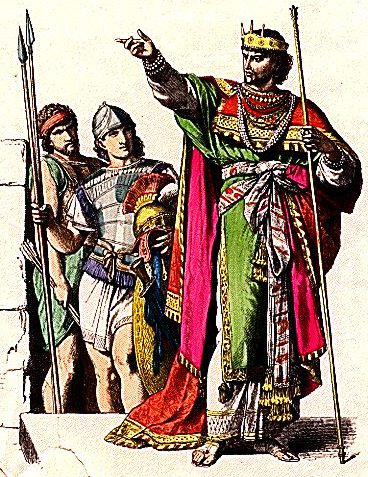
T
The parsha continues discussing the mitzvah to appoint a Jewish King...
After settling into the land if Israel, the Jews were commanded to appoint a Jewish king, destroy Amalek, and build the Bait Hamikdash.
The essence behind a Jewish monarchy is to build the Jewish nation and to elevate the Jewish people religiously (govern them with Jewish law- halachot- and bring righteousness to the nation).
In order to prevent the king from sinning and becoming arrogant, Hashem prescribed the following laws for the king:
1. He may not have extra horses.
2. He may not have more than 18 wives.
3. He may not accumulate excess wealth, other than that necessary to build and maintain his army.
4. He must write a Sefer Torah and keep it with him at all times.
5. He must read parts of the Book of Devarim at a nation assembly every seven years.
Reasons behind these laws:
1. Horses were bred in Egypt and Hashem didn’t want the Jews going back to Egypt for any reason. Also, horses symbolized power, wealth, and arrogance, Hashem didn’t not want the Jewish king to amass more than he needed, hence he would succumb to arrogance. Arrogance leads a man away from Hashem.
2. The king was forbidden to have more than the prescribed number of wives because this can lead a man from Torah studying and observance. The gentile kings had large harems and Hashem did not want the Jewish king to emulate such promiscuous behavior. The role of the Jewish king was to govern the people according to the standards of Torah, not to pursue his personal physical desires.
Indeed, King Solomon had many wives, but on his high level of intelligence, he declared that he was able to withstand all the trials without sinning. In other words, he put himself through the extra struggle in order that Hashem would reward him heavily for defeating his yatar hara. However, as we see, King Solomon was not able to withstand the tests, and his wives did make him go stray.
3. The king was forbidden to accumulate more wealth than his nation needed, because Hashem did not want his personal lust for money take over. Rather Hashem wanted the king to develop his good inclination and to be conscious of providing for his nation.
4. The king was commanded to write a Sefer Torah and to have it on him at all times. Wherever he was, he was obligated to internalize that he was Hashem’s servant. Whenever the king had a free moment, he was obligated to study torah. The king was to be a righteous Torah scholar and leader so that he would be an example to his people.
5. The king was obligated to occupy himself with Torah study and observe Hashem’s mitzvot constantly!
The king had a highly respected role, a person who disrespected him could be executed, no one was allowed to ride his horse or sit on his throne, and everyone (except the kohan gadol) was obligated to bow in his presence. Hashem wanted the Jewish people to give honor to their king, for he represented Hashem’s Kingship.
Despite the honor the king was given, the king maintained his humility. He was constantly in a state of thanksgiving, for being endowed with such a distinguished position. The king was continuously taught not to be haughty,(must carry a Sefer Torah, and all other rules to remind him of his ultimate mission in life, to be Hashem’s servant) so to, how much more are we to develop our humility in the face of Hashem? Seeing that the Jewish king, the ambassador to God, saw His imminence and serviced him in such humility, this should teach us that we too are ambassadors to God who must strive to connect to and follow His Torah!
In this month of Elul, each day we are getting closer and closer to the high holy days, we should be mindful of ways we can develop our humility in front of God. May we all be blessed with the courage to develop that awareness and pursue an everlasting connection with the Source of all, today, tomorrow, and for the rest of our lives! AMEN and SHABBOT SHALOM!

 T
T Parshat Shoftim
Parshat Shoftim